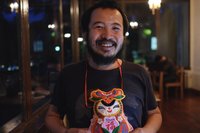
Feng, Xiangjun is a PhD candidate at the department of East Asian Languages and Cultures. His dissertation explores the relationship between print culture and secret knowledge production in China's late imperial and modern periods. But he also has a strong interest in sound studies, on which topic he has published the journal article "Rhythm Revolution: How Music 'Modernized' China" (Modern Chinese Literature and Culture, 2020 fall). The other publication of his, which is more closely related to his dissertation, focuses on the late Qing Chinese novel The Travels of Lao Can and it will appear in the Journal of the Royal Asiatic Society. This year he is also a Duke-DKU global fellow teaching for Duke Kunshan University.

Field, Andrew, Prof., earned a B.A. in Asian Studies at Dartmouth College (1991) and a Ph.D. in East Asian Languages and Cultures at Columbia University (2001). He has taught at universities in America, Australia, China, and Korea. He currently serves as a Professor of History at Duke Kunshan University. He has published three books: Shanghai’s Dancing World: Cabaret Culture and Urban Politics (2010), Mu Shiying: China’s Lost Modernist (2014), and Shanghai Nightscapes: A Nocturnal Biography of a Global City (co-authored with James Farrer, 2015).

Jones, Andrew F. is Louis B. Agassiz Professor in Chinese, received his Ph.D. from the University of California, Berkeley, in 1997. Professor Jones teaches modern Chinese literature and media culture. He is the author of a trio of books on modern Chinese music: Like a Knife: Ideology and Genre in Contemporary Chinese Popular Music (Cornell East Asia Series, 1992), Yellow Music: Media Culture and Colonial Modernity in the Chinese Jazz Age (Duke University Press, 2001), and Circuit Listening: Chinese Popular Music in the Global 1960s (University of Minnesota Press, 2020). He was co-editor of a special issue of positions: east asia cultures critique entitled The Afro-Asian Century, and translator of literary fiction by Yu Hua as well as Eileen Chang's Written on Water (Columbia University Press, 2005). He has also published Developmental Fairy Tales: Evolutionary Thinking and Modern Chinese Culture (Harvard University Press, 2011), and a volume co-edited with Xu Lanjun, 儿童的发现 — 现代中国文学及文化中的儿童问题 [The Discovery of the Child: the Problem of the Child in Modern Chinese Literature and Culture], (Peking University Press, 2011).
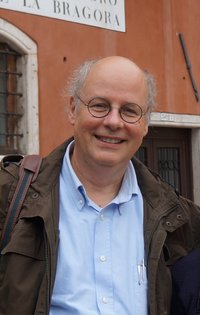
Kouwenhoven, Frank is a music scholar from Leiden, The Netherlands. He studied English language & literature at the University of Utrecht. From 1978 to 1986 he worked as a writer and journalist. Since 1986, he has been visiting China regularly to carry out field work on Chinese music. He has published widely on Chinese music. In 1989, he co-founded the European Foundation of Chinese Music Research (CHIME). He is the main editor of the CHIME journal. He has also produced films and CDs, and has organized European concert tours for Chinese musicians. See: https://www.chimemusic.net.
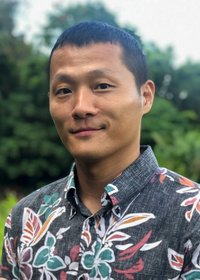
Kuan, Yuan-yu received his Master and PhD (2019) degree in ethnomusicology from the University of Hawaii at Manoa (UHM). He is currently a lecturer in Music and Asian Studies at UHM. Born and raised in Taiwan, Kuan graduated from the Chinese Culture University with a BA in erhu performance. He has been a recipient of fellowship and research grants from the East-West Center and the University of Hawaii.
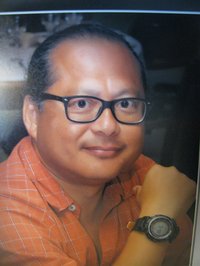
Lau, Frederick is an ethnomusicologist, flutist, and conductor whose scholarly interests include a broad range of topics in Chinese, Western, and Asian music and cultures. He is author of Music in China and co-editor of Making Waves: Traveling Musics in Asia and the Pacific, Vocal Music and Cultural Identity in Contemporary Music: Unlimited Voices in East Asia and the West, Locating East Asia in Western Art Music (Wesleyan 2004). Lau is editor of the book series entitled Music and Performing Arts of Asia and the Pacific, University of Hawaii Press. Currently, he is chair of the Department of Music, professor of Ethnomusicology, and director of the Center for Chinese Music Studies at the Chinese University of Hong Kong. Before CUHK, he was a professor of ethnomusicology at the University of Hawaii at Manoa and California Polytechnic State University.
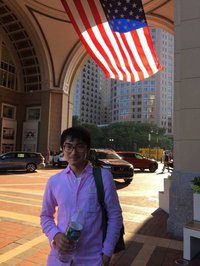
Liu, Chang is a PhD candidate at the Centre for Advanced Cultural Studies, Heidelberg University. He completed his B.A. in 2006 in Manchuria and then moved to Beijing to pursue a career in the music industry. He started as the PR manager of Beijing's first medium sized live music venue Star Live and in collaboration with outside promoters he organized the following artists' Beijing concert: Sonic Youth, James Blunt, Ziggy Marley, Mando Diao, etc. Then he moved on to work with Michael Pettis to promote China's alternative and underground music at Maybe Mars Records. He was musical affairs officer at the French Embassy in China. In 2011, he moved to Germany and continued his academic education. He translated academic articles into Chinese, published articles on Chinese rock music and currently works on his PhD project which examines China’s dakou generation.
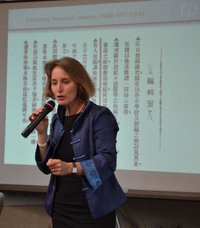
Mittler, Barbara holds a Chair in Chinese Studies at the University of Heidelberg were she co-founded Centre for Asian and Transcultural Studies (CATS). Her research focuses on cultural production in (greater) China covering a range of materials, music, print media, visuality in China’s long modernity. Among her book-length publications are Dangerous Tunes: The Politics of Chinese Music in Hong Kong, Taiwan and the People’s Republic of China since 1949, Harrassowitz 1997; A Newspaper for China? Power, Identity and Change in China’s News-Media, 1872-1912, Harvard University Press, 2004; A Continuous Revolution: Making Sense of Cultural Revolution Culture, Harvard University Press, 2012 and a co-authored book with historian Thomas Maissen entitled Why China did not have a Renaissance and why that matters—an interdisciplinary Dialogue, De Gruyter 2018. She has recently concluded a book-length study on women’s magazines, Portrait(s) of a Trope: Making New Women and New Men in Chinese Women’s Magazines, 1898-2008, and is currently working on a visual biography of Mao, Reading Mao: The Making of a Global Icon as well as a monograph “And there is only one Lang Lang…”—Chinese Musicians on the Global Stage: a Transcultural Perspective.

Moskowitz, Marc L. is a Professor in the Department of Anthropology at the University of South Carolina. Focusing on the intersection between gender and popular culture in Chinese-speaking Asia, he is a recipient of the ACLS-NEH, Chiang Ching-Kuo, Fulbright, and Fulbright-Hays Awards. His monographs include Cries of Joy, Songs of Sorrow: Chinese Pop Music and its Cultural Connotations (University of Hawaii Press), Go Nation: Chinese Masculinities and the Game of Weiqi in China (UC Press), The Haunting Fetus: Abortion, Sexuality, and the Spirit World in Taiwan (University of Hawai’i Press), and Internet Video Culture in China: YouTube, Youku, and the Space in Between (Routledge). He has edited two books on popular culture in Taiwan and made two ethnographic films; the first on funeral strippers in Taiwan, and the second on the game of Go in China. He has also published in a range of journals, including the China Quarterly, Popular Music, Sexualities, and Visual Anthropology. Since his first trip to the PRC in the late 1980s, he lived in Chinese-speaking Asia for a total of twelve years.
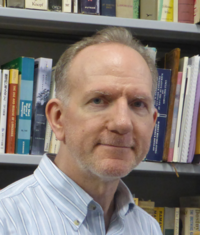
Pope, Edgar W., holds an M.S. in biostatistics from the University of Washington (1987), an M.A. in music education from Kanazawa University (1998), and a Ph.D. in ethnomusicology from the University of Washington (2003). From 1998 through 2008 he taught at Hokusei Gakuen University Junior College in Sapporo. In 2009 he joined the faculty of the Department of International and Cultural Studies at Aichi Prefectural University, near Nagoya, where he is currently a Professor. His research focuses on exoticism and intercultural interaction in popular music, especially in the popular music of prewar and wartime Japan.

Porras, Edwin E. is an ABD Ph.D. candidate in the Department of Ethnomusicology at UCLA. His research focuses in Latin America and is concerned with the music cultures of African and Chinese Diasporas in the region. Thematically, he explores issues of power and the agency of marginalized social groups to effect individual and social change. His dissertation, ”Music-Making Practices of Cubans of Chinese and African Descent: Creating Alternative Ways of Being and Belonging,” explores the cultural dialogue between both social groups.

Rao, Nancy Yunhwa Rao is professor of music at Rutgers University. Her work bridges musicology, music theory, Chinese opera and Sinophone studies. She has published on the use of musical gestures, singing, and percussion patterns of Beijing opera in contemporary music by composers of Chinese origin. Her study on composer Ruth Crawford Seeger won the best article award from the Society for American Music in 2009. Rao’s study of Chinese in North America has led to writings on transnational issues in the production and opera performance in Chinatown theaters. Her book, Chinatown Opera Theater in North America, includes analysis of networks, playbills, aria and spectacles. It has received three book awards, from American Musicological Society, Society for American Music, and Association for Asian American Studies, and Certificate of Merit from Association for Recorded Sound Collection. She is recipient of several ACLS and NEH research fellowships, most recently 2020-21.

Schröder, L. Odila studied Chinese, Political Science and the History of Science at Tsinghua, Cambridge, and Heidelberg University and holds an MA in Chinese and Transcultural Studies from Heidelberg University. Odila is currently pursuing a PhD within the ERC-funded “Cultures of Occupation in 20th Century Asia” Project at the University of Nottingham, focusing on auditory propaganda and concert life in Japanese occupied Beijing (1937-1945). In October 2020, she returned to Heidelberg University as a research associate and project coordinator.

Steen, Andreas is Professor in China Studies at Aarhus University, Denmark. He received his PhD degree in Sinology at the Free University of Berlin (2003). His fields of research concentrate on modern Chinese history and culture, incl. Sino-foreign relations, popular culture, the cultural industries, sound and memory studies.
Related book publications include The Long March of Rock ‘n’ Roll: Pop and Rock Music in the People’s Republic of China (German, 1996), and Between Entertainment and Revolution: Gramophones, Records and the Beginnings of the Music Industry in Shanghai, 1878-1937 (German, 2006). The latter was revised and translated into Chinese as在娱乐与革命之间: 留声机, 唱片与上海音乐工业的开端1878-1937 (Shanghai: Cishu Publishing House 2015). He published widely on China’s music industry, and currently engages in the cooperative and comparative research project entitled “Sounds of War: The Memory of World War II in Taiwan, East Germany and Denmark, 1945-2015” with Prof. Wulf Kansteiner at Aarhus University.

Tan, Hwee-San is Associate Lecturer in Ethnomusicology at Goldsmiths, Senior Teaching Fellow, Research Associate at SOAS, University of London and Visiting Lecturer at Middlesex University. Between 2002-4, she was Chiang Ching Kuo Foundation Postdoctoral Fellow at SOAS. She has held lecturing posts at Durham University (2001-2), University College Dublin (2005-8), University of Surrey (2008-9) and City University (2011-12). Her research focuses on Buddhist ritual and music in Fujian and Taiwan, Intangible Cultural Heritage Policy in China, and music among the Chinese diaspora in Vietnam. She has given invited lectures at universities in Brussels, Ireland, Hong Kong, and New Zealand and public lectures on radio and museums. From 2007 to 2011, she was committee member of the British Forum for Ethnomusicology and Reviews Editor for Ethnomusicology Forum. She has been a member of the Scientific Committee of the International Conference on Heritage and Sustainability organised by Green Lines Institute for Sustainable Development since 2013. She is on the Board of CHIME European Foundation for Chinese Music Research.

Till, Christina is a postdoctoral researcher at the China Branch Office of the Max Weber Foundation in Beijing. Her areas of research include the history of archives in China, the history of modern China and the history of Sino-foreign relations. She received a Ph. D. from the Department of Chinese Language and Culture of the University of Hamburg, where she was part of the graduate school “China in Germany, Germany in China.” Her doctoral thesis, titled “Saving China from Abroad? Chinese leftist students in Germany (1919-1939),” follows the lives of Chinese socialists and communists who studied in Germany during the interwar period. Christina was a visiting researcher at Fudan University in Shanghai, National Taiwan University in Taipei, and Saint Petersburg State University. She is currently working on the history of local and provincial archives in the borderland regions of the Qing dynasty.

Wang, Di is a PhD student at Washington University, St. Louis, specializing in the area of comparative literature and American cultural studies. She received several grants and awards and published, among others, articles on Chinese satire and feminism.

Yamauchi, Fumitaka is Professor and Director at the Graduate Institute of Musicology (GIM), National Taiwan University. He spent an extended period in South Korea, where he received his PhD from the Academy of Korean Studies with a historical ethnography of Korean recordings made under Japanese colonial rule. He was an assistant professor at the Institute for Advanced Studies on Asia, University of Tokyo, for three years (2006-09) before joining the GIM faculty, and a visiting fellow/scholar at Harvard twice (2003-04, 2013-14) and at Yale (2008). His work concerns the intersection among music and sound studies,, postcolonial studies, and historical anthropology with a special emphasis on the regional historicity of East Asia in global contexts. He is the co-editor of the 2012 special issue of The World of Music, “Colonial modernity and East Asian musics” (with Hugh de Ferranti), and currently co-editing Formations of Phonographic Modernity in East and Southeast Asia: Exploring the Gramophone Industry and Music Genres (with Ying-fen Wang, under contract with the University of Illinois Press).